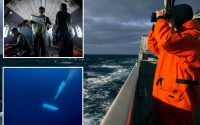20 sharks found dead after killer whales’ feeding frenzy
A pair of notoriously bloodthirsty killer whales lived up to their name by ripping apart 20 sharks whose disemboweled carcasses washed up on a South African beach last week, according to scientists.
The gruesome discovery was made by passersby who came across the mutilated sharks in Gansbaai, a fishing town 100 miles southeast of Cape Town.
Marine biologists believe that the culprits behind what they described as a “surgical” feeding frenzy were two orcas with a well-documented taste for shark liver nicknamed “Port” and “Starboard.”
It’s been suggested that the shark-hunting duo massacred at least 17 of the apex predators “in one sitting.”
“The dead sharks are torn open at the pelvic girdle, they have Orca teeth marks known as rake marks on their pectoral fins and their liver is missing,” Alison Towner, a shark scientist with the Dyer Island Conservation Trust, told the news agency AFP.

“Port” and “Starboard,” who are easily recognizable by their twisted dorsal fins, are well-known to locals in Gasbaai and were last spotted in the ocean three days before the sharks turned up dead on the beach.
“This is the largest amount of sharks these orcas have killed in this area in one sitting,” Towner said.
Towner, who helped perform necropsies on the slaughtered sharks, reported that they were all females; each was torn open and missing its liver.

Nineteen of the marine victims were broad-nosed seven-gill sharks and one was a spotted gully shark.
Ralph Watson, a marine biologist with the local conservation and diving group Marine Dynamics Academy who took part in the sharks’ port-mortems, described the orcas’ killing technique as “surgical.” He explained that the pair targets sharks’ liver because it is “a very nutritious organ, full of oils.”
“They tear open the pectoral girdle chest area… then the liver flops out,” said Watson.

“Starboard” and “Port” have been credited with having caused white sharks to vanish from the waters surrounding Cape Town.
Last year, “Starboard” was among five orcas that were caught on video ganging up on and killing a great white off Mossel Bay.
In the grisly recording, the black and white sea mammals surround their prey and attack, causing the blue-green water to turn red with blood.

“Port” and “Starboard” were first spotted near Cape Town in 2015, likely having come from another region. Unlike other killer whales, they like to hunt near the coast.
Simon Elwen, who heads the scientific group Sea Search, said it was “fascinating, and frustrating” to see “a rare, endangered animal killing another endangered species.”
With Post wires


